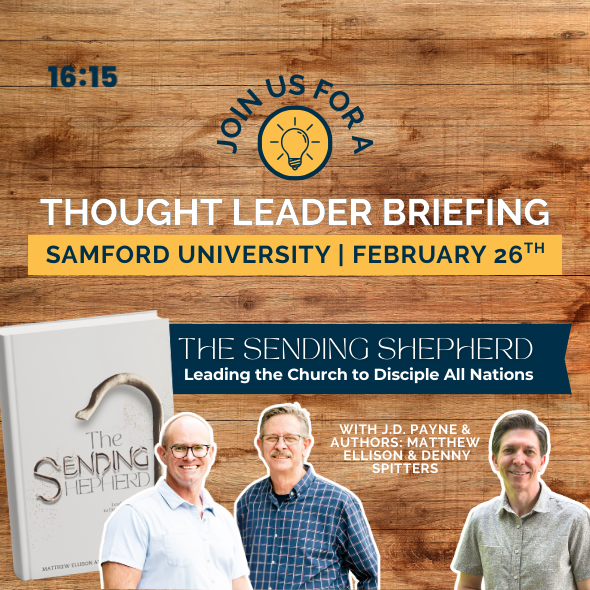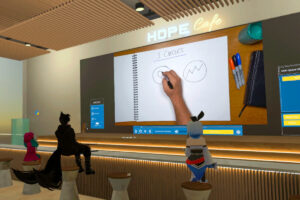Connie Dixon’s hometown in New Mexico has about 200 people, and she’s been part of the same church her entire life.
She’s been just as dedicated to missions discipleship resources provided by national Woman’s Missionary Union. She started in Mission Friends as a preschooler, grew up through Girls in Action and Acteens, became a missions leader in her church and served 13 years as executive director of New Mexico WMU.
There’s one big reason why WMU is so important to Dixon.
“We want to be sure we equip today’s generation for missions, because if we fail to teach this generation the importance of missions, we’re one generation away from having no more missionaries,” Dixon asserted.
As the current national WMU president, Dixon spoke with Jennifer Davis Rash, TAB Media Group editor-in-chief, at an April 24 event called “WM-Who?” at the TAB Media offices in Birmingham.
Rash’s interview with Dixon and a live audience Q&A were intended to help Baptists better understand who WMU is, why it’s important and what it needs to keep going forward.
‘Tried and true’
“It’s tried and true,” Dixon said about WMU’s missions discipleship curriculum and other resources.
But she and other WMU leaders have seen a trend in churches doing less and less missions-centered discipleship in recent years.
“Our missions education and missions discipleship is so important to the growth and health of a church, but we’ve almost made missions discipleship and missions an elective. And it’s not,” Dixon declared. “It’s how you have a healthy church. Missions is not a trend, it’s a commandment.”
WMU has long offered preschool and children’s curriculum — Mission Friends, Girls in Action, Royal Ambassadors and now a new coed curriculum, Missions Journey: Kids. It also offers resources for teens and adults.
“We have been mandated in the Great Commission to go and make disciples, so we provide resources for every age level from preschool through adulthood to learn how to be on mission and see the world and see beyond themselves into the world,” Dixon said. “We want to see the needs and then give them ideas of how they could meet those needs.”
Dixon noted WMU’s intent is not to give churches a cookie-cutter framework they have to fit into. WMU provides customizable resources churches can use to include missions discipleship in their context.
‘Make it yours’
“We want them to fit their culture and what their community and association and state needs,” Dixon explained. “We do not say, ‘This is what a WMU group looks like and this is how it needs to operate’ … we just give you suggestions of how you can do it, and then you can take whatever elements you want to make it yours.”
It’s a grassroots organization, she added.
“The most important person in WMU is the woman or man sitting in the pew or the preschooler going to Mission Friends,” she said
Other topics Dixon addressed were:
- Can men also participate in WMU?
“Yes, they can, from birth,” Dixon said. “We have a place for everyone in WMU.”
Boys are included in Mission Friends, Children in Action and Missions Journey: Kids curriculum as well as Royal Ambassadors, a missions discipleship resource for grade-school boys.
Men also are needed as leaders in missions discipleship and WMU ministries like Christian Men’s Job Corps and Christian Women’s Job Corps, which equips men and women for life and employment in a Christian context.
- What other types of work does WMU do?
WMU includes compassion ministries such as WorldCrafts, which develops sustainable, fair-trade businesses among impoverished people around the world.
Pure Water, Pure Love provides clean water through water filtration systems and well-drilling projects, spanning Asia to New Mexico, where Dixon said she’s seen the effects of a well dug on a Navajo reservation.
- How is WMU funded? Does it receive Cooperative Program money?
National WMU does not receive any CP funds and never has, Dixon stated.
Its work is funded primarily through the sale of resource materials and supplemented with funds from the WMU Foundation and generous donors.
Some state WMUs are funded or partially funded by state Cooperative Program dollars, but national WMU receives no CP money to fund its work.
- How diverse is WMU?
Across the board, there is great diversity in WMU at the national, state and local church levels, Dixon said.
“Our board is probably the most diverse board in all of [Southern Baptist Convention] life.”
One third of the WMU executive board is made up of women of color, and seven state executive directors are women of color, Dixon noted. Leaders also represent a range of ages and life stages.
WMU has recognized work in 49 countries and every U.S. state.
“It’s a very diverse organization, and we love that,” she said. “We’re hoping to have more and more of that.”
- How can local Baptist associations support WMU?
It’s a great help for associations to hold missions fairs and offer an opportunity for WMU to be heard from the associational office, Dixon said.
Having associational WMU directors is also a great way for WMU to resource associations so they can resource individual churches.
“If there are any needs, especially in smaller associations, we want to let them know we would love to work with them and resource them and help them in any way we can,” Dixon said.
- How long has WMU been serving its mission?
WMU was organized in 1888 and has continued to serve faithfully.
“We’re not your grandmother’s WMU,” Dixon quipped, “but that 134-year-old heritage doesn’t go away. We still have the same objectives that we want people to grow in their faith and learn about missions and pray for missions and give sacrificially and do missions. But we also want them to do it their way.
“And we want to make sure we equip today’s generation for missions,” she declared.
To view the video of Dixon’s interview visit youtube.com/tabmediagroup. To learn more about WMU visit wmu.com.
National WMU moves toward finding the ‘right footprint’
National Woman’s Missionary Union is taking another step toward finding the “right footprint” for its staff in 2022, according to Julie Walters, corporate communications manager.
They plan to move operations to the first floor of their building as second-floor tenant Lifeline Children’s Services prepares to relocate this summer to a 66,000-square-foot facility gifted to them.
Emptying the top two floors of the 135,000-square-foot WMU building will save energy costs and give WMU an opportunity to determine the optimal office arrangement for its team, Walters said.
The building at 100 Missionary Ridge in Birmingham has been on the market for about a year, after board members voted in January 2021 to explore the possibility of selling it.
Smaller staff
“We had about 160 staff members in 1984 when the building was built. With printing changes and other changes, our staff is much smaller,” Walters explained. “The building is a much larger footprint than we need for all the staff who work on site.”
National WMU has some 30 full-time and part-time staff and also works with independent contractors and volunteer leaders. Fewer than 20 employees work on site all the time.
“With COVID-19 we adopted a remote work policy,” Walters noted. “We have some staff who work here 100% of the time, some who work in the office some days and at home some days and others who are fully remote.”
The WMU Foundation, a separate 501(c)(3), also occupies the building, with most of its staff working in a hybrid format.
Walters said WMU leaders knew the sale of the building would likely be slow as the Highway 280 corridor is flooded with available office space as more companies move to remote work.
‘The right buyer’
“We are actively showing the building, but it is going to take God bringing the right buyer at the right time,” Walters said.
While curriculum sales dipped during the pandemic as many churches moved away from in-person meetings, Walters said numbers are beginning to rebound.










